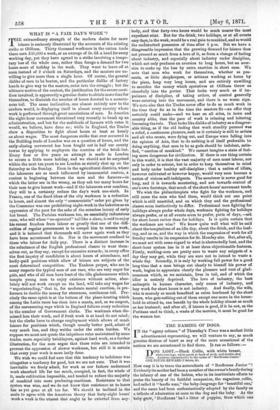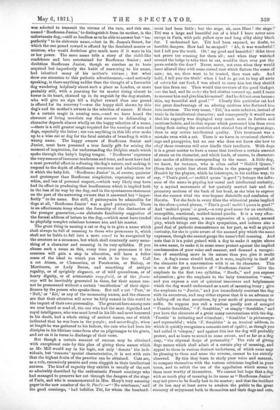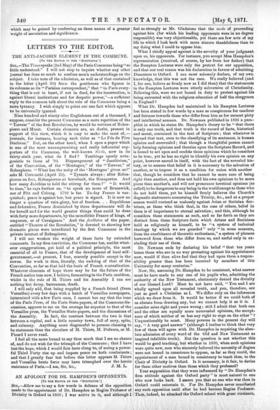THE NAMING OF DOGS.
TN the "agony column" of Thursday's Times was a modest little advertisement representing, we will venture to say, as much genuine distress of heart as any of the more sensational of the notices we are accustomed to find there. It ran as follows :— TA OG LOST.—Black Collie, with white breast,
white fore legs, white patch at back of neck, and double-dew
claws. Answers (imperfectly) to the name of " Bootieums Junior." ONE POUND REWARD if taken, &e.
How easy it is to trace the antecedents of " Boofleums Junior "! Evidently its mother had been a member of the owner's family during the infancy of one of the babies, who in its inarticulate efforts to praise the beauty of its faithful companion, the sagacious, collie, had called it "bootie unas," the baby-language for beautiful one,' and the name had been enthusiastically adopted by the family as a tribute of admiration at once to the dog and the baby. As the baby grew, Boofleums ' hal a litter of puppies, from which one was selected to transmit the virtues of the race, and this one, named Boofleurns Junior,' to distinguish it from its mother, is the unfortunate dog,—still so heedless as to be able to answer but " im- perfectly " to its elaborate name,—lost in St. James's Street, for which the one pound reward is offered by the desolated master or mistress, who would doubtless give much more if it were in his or her power. The mere name tells a story of the child-like confidence and love entertained for Boofleums Senior ; and doubtless Boofleums Junior, though so careless as to have acquired but imperfectly the habit of answering to his name, had inherited many of his mother's virtues ; but what drew our attention to this pathetic advertisement,—and seriously speaking, is there anything sadder than the thought of a favourite dog wandering helplessly about such a place as Landon, or more probably still, with a yearning for its master rising almost to terror in its heart, chained up in its anguish by the dog-stealers, who will give no sign till a higher reward than one pound is offered for its recovery ?—was the happy skill shown by this dog's and its mother's owners in the selection of names. If there be a certain magic in naming men,—and we have heard the cleverest of living novelists say that success in delineating a character depends almost wholly on the happy selection of a name, —there is a still greater magic required for the naming of cats and dogs, especially the latter ; nor can anything in this life ever make up to a wise cat or dog for the fatal mistake of branding it with a wrong name. The happy owners of Boofleums Senior and Junior, mast have possessed a true family gift for seizing the moaaent of inspiration, for understanding the Delphic oracle which spoke through the baby's lisping tongue. Boofleums ' expresses the veryesseuce of innocent tenderness and trust, and must have had a most powerful effect in softening the dog's nature, and making it respond to the depth of affectionate reverence and admiration for it which the baby felt. Boofleums Junior' is, of course, quainter and grotesquer than Boofleums simpliciter, expressing more of whim, and less of personal respect,—which very likely may have had its effect in producing that heedlessness which is implied both in the loss of its way by the dog, and in the spontaneous statement on the part of the sorrowing owners that it answered but " imper- fectly " to its name. But still, if patronymics be admissible for dogs at all,'Boofleums Junior' was a good patronymic. There is an affectionate irony about the formality of the distinction of the younger generation,—an elaborate familiarity suggestive of the formal address of letters to the dog,—which must have tended to playfully complex relations between him and his master.
The great thing in naming a cat or dog is to give a name which shall always be full of meaning to those who pronounce it, which shall not be liable to fall into a mere sound to be recognized by the creature as a summons, but which shall constantly carry some- thing of a character and meaning in its very syllables. If you choose such a name as this, every time you pronounce it the creature will gain a step in education, will have a fuller sense of the ideal to which you wish it to live up. Call a cat Atossa, or Clementine, or Pocahontas, or Bishop, or Mortimore, or Lady Bacon, and something of antique regality, or of sprightly elegance, or of wild queenliness, or of heavy dignity, or of aristocratic sang-froid, or of the femme sage will be inevitably generated in them, for their names can- not be pronounced without a certain 'recollection' of their signi- licence by the person who speaks them. But call a cat Puss,' or 'Nell,' or Sit,' or any of the unmeaning names, and the chances are that their attention will never be fully roused in this world to the import of their own personality. The greatest hero among cats we ever heard or read of, the one who had the most dignified and royal intelligence, who was most loved in his life and most honoured in his death, had a whole string of ancient names, one of which indicated that he was born in the purple ; and accordingly, when at length he was gathered to his fathers, the cats who had been his disciples in his lifetime came from afar on pilgrimages to his grave, and sat on it in turns in discharge of their vows.
But though a certain amount of success may be obtained with exceptional cats -by this plan of giving them names which as Mr. Mill would say in his logic, not only 'denote' the indi- viduals, but 'connote' special characteristics, it is not with cats that the highest fruits of the practice can be obtained. Cats are, as a rule, excessively passive and even sluggish in their intellectual natures. The kind of sagacity they exhibit is usually of the sort so admirably described by the enthusiastic French concierge who had managed to preserve her cat through the dangers of the siege of Paris, and who is commemorated in Mrs. Hoey's very amusing paper in the new number of the St. Paul's:—" 'No mischance,' said the good concierge, had befallen Titi, for whom the bombard-
merit had been little ; but the siege, ah, mon Dieu I the siege !' Titi was a large and beautiful cat of a kind I have never seen except in Paris, with pale yellow eyes and long silky shiny black fur. I understood her. Titi had been exposed, no doubt, to horrible dangers. How had he escaped? 'Ah, it was wonderful ! but I tell you the truth. Oh! my good and beautiful ! didst thou -not prove too cunning for them all ; and when they watched around the lodge to take thee to eat, would'st thou ever put thy paws outside the door? Never, never, not even when they would have allured thee with some cursed root which flatters the noses of cats ; no, no, thou west to be trusted, thou west safe. And hold, I tell you the tfuth! when I had to go out to buy all aorta of saleta for our food, I was afraid to carry him lest they should tear him from me. Then would this creature of the good God get into the bed, and lie under the bed-clothes covered up, until I came to uncover him and give him his morsel! And he did not even become thin, my beautiful and good !' " Clearly this particular cat had the great disadvantage of an adoring mistress who flattered him into inertness. The very name, Titi,' is a mere sedative, instead of tonic in its intellectual character; and consequently it would seem that his sagacity was displayed very much more in furtive and cautions habits, and in that repose which prevented him from even losing flesh during the anxieties and stinted fare of the great siege, than in any active intellectual quality. This treatment was a mistake even with a cat. There is no harm in occasional cherish- ings and panegyrics, but no one who does not know also how to chaff these creatures will ever kindle their intellects. With dogs it is a great matter to have a name that involves a certain amount of strain on its character, and which leads, of course, to character- istic modes of address corresponding to the name. A little dog, we know, for instance, who is often called " Mobled Queen," (from that quaint line about Hecuba in the passage repeated to Hamlet by the players, which he interrupts, in his sudden way, to say, "That's good,—' moblei queen ' is good ") betrays the influ- ence of the name in piquing her moral and intellectual curiosity, by a myriad movements of her quaintly matted hair and de- precatory motions of the back of her head, as she tries to express that she cannot rival the woe-begone dishabille and confusion of Hecuba. Yet she feels in every fibre the whimsical praise implied in the often-quoted phrase, "That's good ! moblei queen is good!" And mobled queen' is good,—a very good name for an excitable, susceptible, emotional, matted-haired poodle. It is a very effec- tive and educating name, a name expressive of a quaint, amused pity, which brings out the dog's sympathies, and induces also a good deal of pathetic remonstrance on her part, as well as piqued curiosity, for she is quite aware of the amused pity which the name expresses, though she cannot gauge the name's full meaning. And note that it is a point gained with a dog to make it aspire above its own name, to make it in some sense protest against the implied condescension of your voice and manner, and demand a recogni- tion of something more in its nature than you give it credit for. A dog's name should hold, as it were, implicitly in itself all the elements for a conversation with it on its character. This is one of the great beauties of "Boofleums Junior." Give the emphasis to the first two syllables, " Boofle," and you express admiration ; give the emphasis to the baby termination "urns," and you express a sort of quizzical innocence and helplessness which the dog would understand as a sort of caressing irony ; give the emphasis to "Junior," and you immediately contrast the dog with its ancestress, and may either express that it is an advance or a falling-off on that ancestress, by your mode of pronouncing the suffix. So suppose you call a restless poodly sort of mongrel "Frantic Scrabbler," "F. Scrabbler," or simply "Scrabbler," and you have the elements of a greet many conversations with the dog- ' Frantic ' is irritating and stimulant ; 6 Scrabbler ' is picturesque and reproachful ; while F. Scrabbler' is an ironical address, in which it quickly recognizes a sarcastic sort of egalitd, as though you had called it 'citoyen;' and against this last the dog will probably protest, and so learn to sound to some extent, and so far as a dog may, "the abysmal deeps of personality." The rule of giving dogs names which shall admit of a certain play of meaning, and appeal to them in various distinct undertones, of which some may be pleasing to them and some the reverse, cannot be too strictly observed. By this they learn to study your voice and manner, to compare themselves with the various criticisms implied in your tones, and to solicit the use of the appellation which seems to them most worthy of themselves. We cannot but hope that a dog with so much play of meaning in its name as "Boofleums Junior" may not prove to be finally lost to its master ; and that the incident of its loss may at least serve to awaken the public to the great economy of enjoyment both to themselves and their doge and cats, which may be gained by conferring on them names of a greater weight of association and significance.


































 Previous page
Previous page